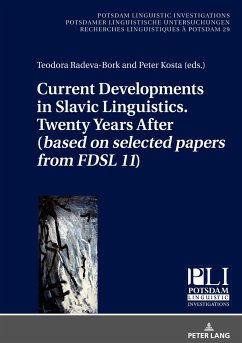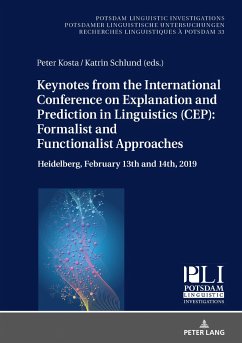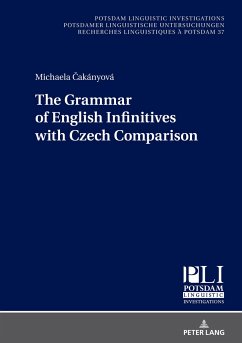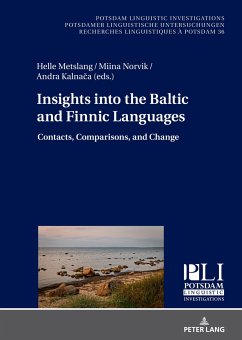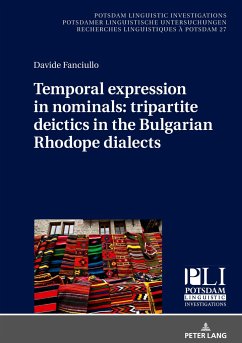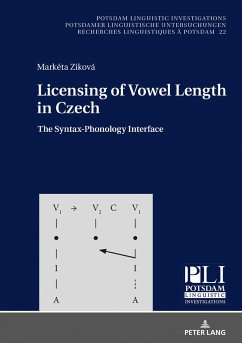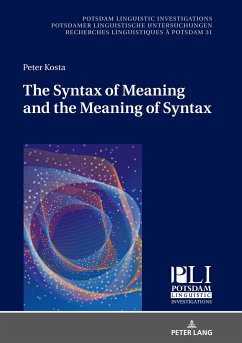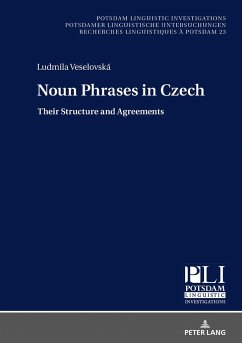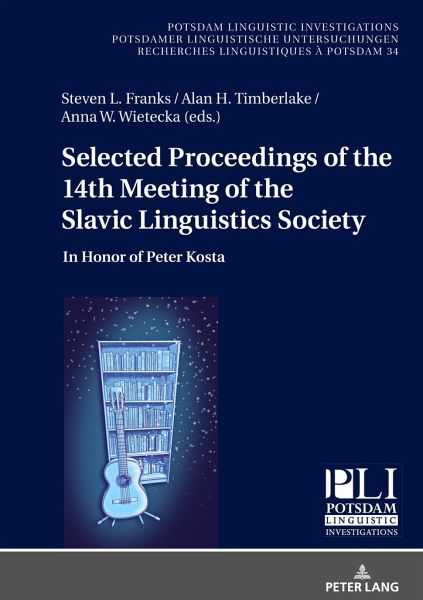
Selected Proceedings of the 14th Meeting of the Slavic Linguistics Society
In Honor of Peter Kosta
Herausgegeben: Kosta, Peter; Franks, Steven L.; Timberlake, Alan H.; Wietecka, Anna W.
Versandkostenfrei!
Versandfertig in 6-10 Tagen
89,00 €
inkl. MwSt.

PAYBACK Punkte
0 °P sammeln!
The volume is a collection of papers in diverse areas of Slavic linguistics, selected from the 14th annual meeting of the Slavic Linguistics Society, held at the University of Potsdam on 11-13 September 2019. The volume is dedicated to Peter Kosta, longtime chair of Slavic linguistics at the Department of Slavic languages and literatures at the University of Potsdam, in recognition of his enormous contributions to the field.Contents: Publications of Peter Kosta - Vrinda Subhalaxmi Chidambaram: A Case of Parasitic Attrition: The disappearance of the degree morpheme - s in Bulgarian and Macedoni...
The volume is a collection of papers in diverse areas of Slavic linguistics, selected from the 14th annual meeting of the Slavic Linguistics Society, held at the University of Potsdam on 11-13 September 2019. The volume is dedicated to Peter Kosta, longtime chair of Slavic linguistics at the Department of Slavic languages and literatures at the University of Potsdam, in recognition of his enormous contributions to the field.
Contents: Publications of Peter Kosta - Vrinda Subhalaxmi Chidambaram: A Case of Parasitic Attrition: The disappearance of the degree morpheme - s in Bulgarian and Macedonian superlative adjectives - Steven Franks: Reflexive Typology, Movement, and the Structure of NP - Jadranka Gvozdanovic:'Have' + infinitive in Czech: A long multilingual history - Iliyana Krapova and Tomislav Socanac: Factivity in South Slavic languages: Complement and relative clauses - Alexander Letuchiy: 'Missed TAM': The lack of tense and mood marking in Russian argument conditionals - semantic and formal motivation - Franc Lanko Marusic and Rok Zaucer: Investigation of Slovenian copular agreement - James Joshua Pennington: Today's Grammaticalization Theory is Yesterday's Grammaticalization: The BCMS Future as An(other) Strike Against the Unidirectionality Hypothesis - Katrin Schlund: On the origin of East Slavic Elemental Constructions/Adversity Impersonals. Evidence from town chronicles of Old Rus' - Luka Szucsich and Karolina Zuchewicz: Incrementality and (non)clausal complementation in Slavic - Alan Timberlake: String Syntax - Beata Trawinski: Polish zeby under Negation - Mladen Uhlik and Andreja Zele: Reflexive Possessive Pronouns in Slovene: A Contrastive Analysis with Russian - Vladislava Warditz: Structural Variation in Heritage Russian in Germany: Language Usage or Language Change? - Jacek Witkos: On Some Aspects of Agree, Move and Bind in the Nominal Domain - Ilse Zimmermann : On Pronouns Relating to Clauses
Contents: Publications of Peter Kosta - Vrinda Subhalaxmi Chidambaram: A Case of Parasitic Attrition: The disappearance of the degree morpheme - s in Bulgarian and Macedonian superlative adjectives - Steven Franks: Reflexive Typology, Movement, and the Structure of NP - Jadranka Gvozdanovic:'Have' + infinitive in Czech: A long multilingual history - Iliyana Krapova and Tomislav Socanac: Factivity in South Slavic languages: Complement and relative clauses - Alexander Letuchiy: 'Missed TAM': The lack of tense and mood marking in Russian argument conditionals - semantic and formal motivation - Franc Lanko Marusic and Rok Zaucer: Investigation of Slovenian copular agreement - James Joshua Pennington: Today's Grammaticalization Theory is Yesterday's Grammaticalization: The BCMS Future as An(other) Strike Against the Unidirectionality Hypothesis - Katrin Schlund: On the origin of East Slavic Elemental Constructions/Adversity Impersonals. Evidence from town chronicles of Old Rus' - Luka Szucsich and Karolina Zuchewicz: Incrementality and (non)clausal complementation in Slavic - Alan Timberlake: String Syntax - Beata Trawinski: Polish zeby under Negation - Mladen Uhlik and Andreja Zele: Reflexive Possessive Pronouns in Slovene: A Contrastive Analysis with Russian - Vladislava Warditz: Structural Variation in Heritage Russian in Germany: Language Usage or Language Change? - Jacek Witkos: On Some Aspects of Agree, Move and Bind in the Nominal Domain - Ilse Zimmermann : On Pronouns Relating to Clauses





